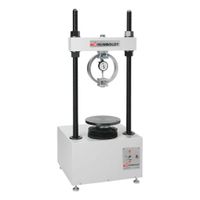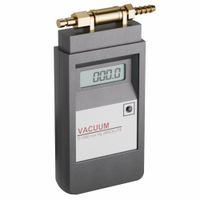Call +(254) 703 030 000 / 751 483 999 / 721 704 777
- Home
- Test Instruments
- Concrete Asphalt Pavement Testing
- Asphalt Testing
.....Read More
Frequently Asked Questions
What is the purpose of asphalt testing equipment?
The purpose of asphalt testing equipment is to evaluate the properties and performance of asphalt materials used in construction, particularly in road and pavement applications. This equipment ensures that the asphalt mix meets the required standards and specifications for durability, safety, and longevity. Key objectives include:
1. **Quality Control**: Asphalt testing equipment helps in maintaining the quality of asphalt by assessing its composition and consistency. This ensures that the mix is suitable for the intended application and meets industry standards.
2. **Performance Evaluation**: By simulating real-world conditions, testing equipment evaluates how asphalt will perform under various stresses, such as traffic loads and environmental conditions. This includes tests for resistance to deformation, fatigue, and thermal cracking.
3. **Material Characterization**: Equipment is used to determine the physical and chemical properties of asphalt, such as viscosity, density, and temperature susceptibility. This characterization is crucial for selecting the right type of asphalt for specific projects.
4. **Compliance and Safety**: Testing ensures compliance with regulatory standards and safety requirements. It helps in identifying potential issues that could lead to premature failure or safety hazards, such as skidding or potholes.
5. **Research and Development**: In R&D, asphalt testing equipment is used to develop new materials and technologies that improve the performance and sustainability of asphalt pavements.
6. **Cost Efficiency**: By ensuring the right mix and quality, testing helps in reducing maintenance costs and extending the lifespan of pavements, leading to cost savings over time.
Overall, asphalt testing equipment is essential for ensuring the reliability, safety, and efficiency of asphalt pavements, contributing to better infrastructure and transportation systems.
How does an asphalt testing compactor work?
An asphalt testing compactor is a device used to simulate the compaction of asphalt mixtures in a controlled laboratory setting, ensuring that the material will perform adequately in real-world conditions. The process begins with the preparation of an asphalt sample, which is typically heated to a specific temperature to mimic the conditions during road construction.
The compactor consists of a mold where the asphalt sample is placed. The mold is usually cylindrical, and its dimensions are standardized to ensure consistency across tests. Once the sample is in place, the compactor applies a series of controlled forces to simulate the compaction process that occurs during road paving.
There are different types of asphalt compactors, such as gyratory compactors and Marshall compactors. A gyratory compactor applies a combination of pressure and a gyratory motion to the sample, which closely replicates the kneading action of rollers used in the field. The sample is subjected to a specified number of gyrations, which helps in achieving the desired density and air void content.
In contrast, a Marshall compactor uses a hammer to apply repeated blows to the sample, compacting it in layers. The number of blows and the weight of the hammer are predetermined based on the test specifications.
Throughout the compaction process, parameters such as pressure, temperature, and the number of cycles or blows are carefully controlled and recorded. After compaction, the sample is removed from the mold and tested for properties like density, stability, and flow. These tests help determine the optimal asphalt mix design and ensure that the material will withstand traffic loads and environmental conditions when used in pavement construction.
What are the types of asphalt testing equipment?
Asphalt testing equipment is essential for evaluating the properties and performance of asphalt materials. The main types include:
1. **Binder Testing Equipment**: Used to assess the properties of asphalt binders. Key equipment includes:
- **Dynamic Shear Rheometer (DSR)**: Measures the viscoelastic properties of asphalt binders.
- **Rotational Viscometer**: Determines the viscosity of asphalt at different temperatures.
- **Bending Beam Rheometer (BBR)**: Evaluates low-temperature stiffness and relaxation properties.
2. **Aggregate Testing Equipment**: Ensures the quality of aggregates used in asphalt mixtures. Important tools include:
- **Sieve Shakers**: Used for particle size distribution analysis.
- **Los Angeles Abrasion Machine**: Assesses the hardness and abrasion resistance of aggregates.
- **Specific Gravity and Absorption Equipment**: Determines the density and porosity of aggregates.
3. **Mixture Testing Equipment**: Evaluates the performance of asphalt mixtures. Key equipment includes:
- **Marshall Stability Tester**: Measures the stability and flow of asphalt mixtures.
- **Superpave Gyratory Compactor**: Simulates the compaction of asphalt mixtures under traffic conditions.
- **Hamburg Wheel-Tracking Device**: Tests the rutting and moisture susceptibility of asphalt mixtures.
4. **Performance Testing Equipment**: Assesses the long-term performance of asphalt pavements. Notable equipment includes:
- **Fatigue Testing Machines**: Evaluate the fatigue life of asphalt mixtures under repeated loading.
- **Thermal Stress Restrained Specimen Test (TSRST)**: Measures the thermal cracking potential of asphalt mixtures.
5. **Field Testing Equipment**: Used for on-site evaluation of asphalt pavements. Key tools include:
- **Nuclear Density Gauge**: Measures the density and moisture content of compacted asphalt layers.
- **Falling Weight Deflectometer (FWD)**: Assesses the structural capacity of pavements.
These tools are crucial for ensuring the quality, durability, and performance of asphalt pavements.
How is the strength of asphalt measured?
The strength of asphalt is primarily measured through several key tests that assess its performance characteristics, including stability, flow, stiffness, and resistance to deformation.
1. **Marshall Stability Test**: This test evaluates the maximum load an asphalt sample can withstand before failure. A cylindrical specimen is loaded at a constant rate until it breaks, and the maximum load is recorded as the Marshall Stability value. The test also measures the flow value, which is the deformation the sample undergoes at the point of failure.
2. **Superpave Gyratory Compactor (SGC)**: This method assesses the compactibility and density of asphalt mixtures. It simulates the compaction process during pavement construction and measures the mixture's ability to resist deformation under load.
3. **Indirect Tensile Strength (ITS) Test**: This test determines the tensile strength of asphalt by applying a diametral load to a cylindrical specimen until it fails. The ITS value helps predict the mixture's resistance to cracking.
4. **Dynamic Modulus Test**: This test measures the stiffness of asphalt at various temperatures and loading frequencies. The dynamic modulus is a critical parameter for evaluating the material's ability to withstand traffic loads over time.
5. **Rutting Resistance Tests**: These include the Hamburg Wheel-Tracking Test and the Asphalt Pavement Analyzer (APA) test, which simulate long-term loading conditions to assess the mixture's resistance to permanent deformation or rutting.
6. **Fatigue Testing**: This involves subjecting asphalt samples to repeated loading to determine their fatigue life, which is the number of cycles the material can endure before cracking.
These tests collectively provide a comprehensive understanding of asphalt's mechanical properties, ensuring it meets the necessary performance standards for road construction and maintenance.
What is the significance of specific gravity in asphalt testing?
Specific gravity in asphalt testing is crucial for determining the density and quality of asphalt materials. It helps in assessing the voids in mineral aggregates (VMA) and voids filled with asphalt (VFA), which are essential for ensuring the durability and stability of asphalt pavements. By measuring specific gravity, engineers can calculate the asphalt binder content and ensure the mix design meets the required specifications for optimal performance.
Specific gravity tests, such as bulk specific gravity and maximum specific gravity, provide insights into the compaction level and air void content of the asphalt mix. Proper compaction is vital for preventing issues like rutting, cracking, and moisture damage. The specific gravity values also aid in the volumetric analysis of the asphalt mix, which is necessary for determining the appropriate proportions of aggregate and binder.
Furthermore, specific gravity is used to calculate the theoretical maximum density (TMD) of the asphalt mix, which is a benchmark for evaluating the compaction achieved during construction. This ensures that the pavement can withstand traffic loads and environmental conditions over its lifespan.
In summary, specific gravity is a key parameter in asphalt testing that influences mix design, quality control, and performance evaluation, ultimately contributing to the longevity and effectiveness of asphalt pavements.
How do you ensure the accuracy of asphalt testing results?
To ensure the accuracy of asphalt testing results, several key practices should be followed:
1. **Standardized Procedures**: Adhere to standardized testing methods such as those outlined by ASTM, AASHTO, or local standards. This ensures consistency and reliability across tests.
2. **Calibration of Equipment**: Regularly calibrate testing equipment to maintain precision. Calibration should be done according to the manufacturer's specifications and verified with standard reference materials.
3. **Qualified Personnel**: Ensure that testing is conducted by trained and certified technicians. Proper training minimizes human error and enhances the reliability of results.
4. **Sample Handling**: Properly collect, label, and store samples to prevent contamination or degradation. Use appropriate containers and maintain the correct temperature and humidity conditions.
5. **Quality Control Checks**: Implement internal quality control measures, such as duplicate testing and cross-verification with independent labs, to identify and rectify discrepancies.
6. **Data Review and Validation**: Conduct thorough reviews of test data for consistency and accuracy. Use statistical methods to validate results and identify outliers or anomalies.
7. **Documentation and Traceability**: Maintain detailed records of all testing procedures, equipment calibrations, and personnel involved. This ensures traceability and accountability.
8. **Regular Audits and Inspections**: Perform regular audits of testing processes and equipment. External inspections by accreditation bodies can provide an additional layer of assurance.
9. **Continuous Improvement**: Encourage a culture of continuous improvement by analyzing past errors and implementing corrective actions. Stay updated with advancements in testing technologies and methodologies.
10. **Environmental Controls**: Maintain controlled environmental conditions during testing to prevent external factors from affecting results, such as temperature and humidity.
By integrating these practices, the accuracy and reliability of asphalt testing results can be significantly enhanced, ensuring compliance with quality standards and project specifications.
What standards are followed in asphalt testing?
In asphalt testing, several standards are followed to ensure quality, performance, and safety. Key standards include:
1. **ASTM International Standards**:
- **ASTM D5**: Standard Test Method for Penetration of Bituminous Materials, which measures the hardness or softness of asphalt.
- **ASTM D36**: Standard Test Method for Softening Point of Bitumen (Ring-and-Ball Apparatus), determining the temperature at which asphalt attains a particular degree of softness.
- **ASTM D92**: Standard Test Method for Flash and Fire Points by Cleveland Open Cup Tester, assessing the temperature at which asphalt emits vapors that ignite.
- **ASTM D113**: Standard Test Method for Ductility of Bituminous Materials, evaluating the material's ability to deform under stress.
2. **AASHTO Standards** (American Association of State Highway and Transportation Officials):
- **AASHTO T 245**: Standard Method of Test for Resistance to Plastic Flow of Bituminous Mixtures Using Marshall Apparatus, used for mix design and quality control.
- **AASHTO T 283**: Standard Method of Test for Resistance of Compacted Asphalt Mixtures to Moisture-Induced Damage, assessing the potential for moisture damage.
3. **EN Standards** (European Standards):
- **EN 12697**: A series of standards covering various aspects of asphalt testing, including compaction, density, and void content.
- **EN 13108**: Standards for bituminous mixtures, specifying requirements for different types of asphalt.
4. **Superpave Standards**:
- Developed under the Strategic Highway Research Program (SHRP), these standards focus on performance-based specifications, including tests for rutting, fatigue, and thermal cracking.
These standards ensure that asphalt materials meet the necessary specifications for durability, safety, and performance in various environmental conditions.

